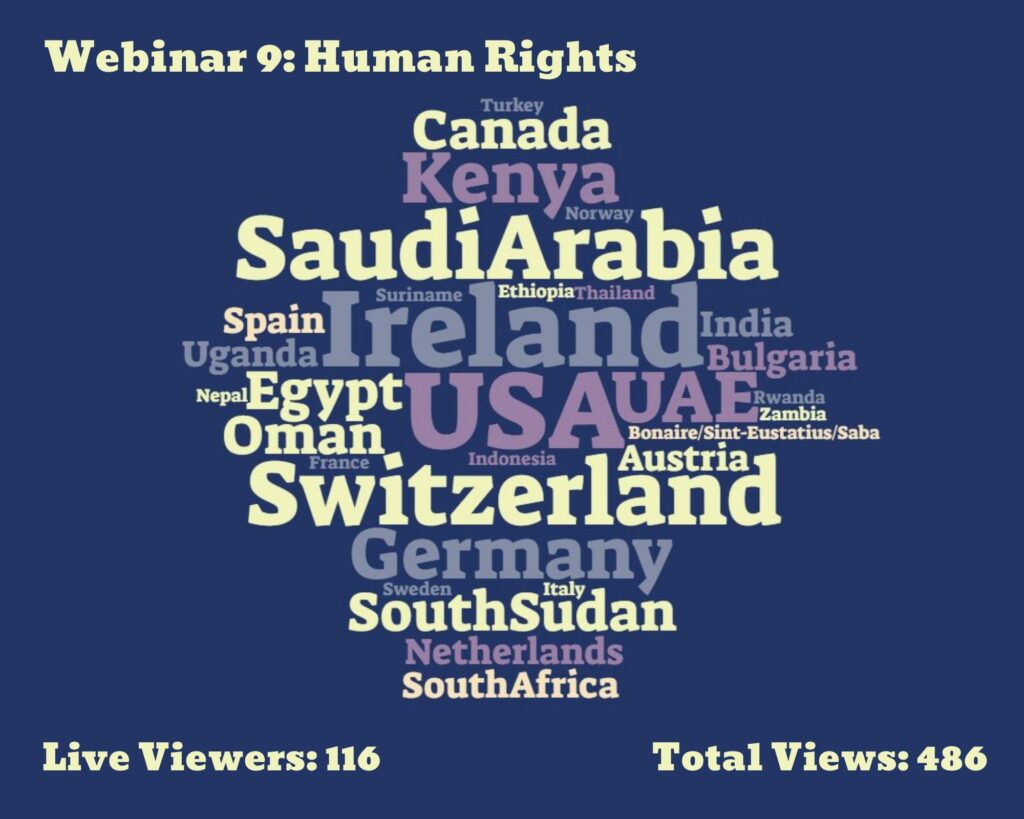Conversations on COVID-19 9th Webinar: Balancing Human Rights & Competing Priorities in the Global COVID-19 Response
 WEBINAR SERIES: WEEK NINE Balancing Human Rights & Competing Priorities in the Global COVID-19 Response
WEBINAR SERIES: WEEK NINE Balancing Human Rights & Competing Priorities in the Global COVID-19 Response
This week’s webinar was co-hosted by the African European Parliamentarians Initiative (AEPI).
The ninth webinar was held on Friday 15/05/2020 at 12:00 pm GMT/1PM Irish Time.
VIEW THE WEBINARA SUMMARY OF POINTS MADE
Gregg Gonsalves, Epidemiology and Global Health Advocate, Yale University
Gregg has experience with ‘undiagnosed populations’ with HIV. With COVID-19, those most at risk in the USA are those with professions which don’t allow for social distancing measures, and the virus is disproportionately affecting people of colour – testing must be increased greatly, but it is vital that this be done equitably.
This is a very serious pandemic, but we must keep HIV, malaria, TB, and other very serious illnesses as priorities too. Gregg tells us that “None of us are safe until all of us are safe” – for those who are most vulnerable, human rights frameworks and responses are more important than ever. Speak out – Leadership is vital, at community level as well as governmental. A bottom-up approach to COVID-19 will be necessary; supporting communities to deal with the crisis on the ground.
To learn more about Gregg Gonsalves, CLICK HERE
Michael Higgins, Senior Program Officer, Pathfinders Program Lead on Inequality and Exclusion at NYU Centre on International Cooperation
Michael is part of a cross-regional platform that shares information on addressing inequality and exclusion, but now also serves as a way to share information on COVID-19 response with a rights-based lens. In some sense, the pandemic has given communities on the ground agency within the response, and supporting citizen-led efforts can be seen to be very effective. Countries such as New Zealand have made efforts to provide supports to the most vulnerable groups in their society, and therefore have avoided the disproportionate effects on native populations/vulnerable groups seen in the US/UK etc.
Some of the more successful responses have occurred in the most rights-friendly spaces – the perceived tension between protecting human health/life and the exercise of human rights is not necessarily the case. Each country is different, and the more transparent governments can be the better. Trust must be earned, and for restrictions to be seen as well-intentioned, education and information are vital. Communities must be empowered, because they are experts in their own lives and livelihoods, and trade unions will play a crucial role.
Michael Higgins has written the following papers:
Challenge Paper: Inequality and Exclusion
Solidarity in the Time of Corona
Attiya Waris, Professor and Writer, University of Nairobi, Kenya
Social contracts are in crisis currently: social contracts are traditionally between people and the state, but this pandemic could provide a catalyst for huge change, either positive or negative. Constitutions in many African countries are very old, and so this could be a chance to either re-evaluate the role of governmental institutions, or for a shift to more negative social norms, such as reporting on community behaviour to the government.
Globally, financing and funding for crises is often approached by shifting budget from other governmental areas. However, countries that are doing well during COVID-19 often had a emergency fund ahead of time. Effects on the climate will be a concern in the coming months, and Attiya also raised the possibility of solidarity taxes.
“Finance must be used to raise living standards… Rights require resources” Rights eg. the right to life must be attached to policies and tax revenues.
To learn more about Attiya, CLICK HERE
Odette Nyiramilimo, Rwandan Physician, Senator, and Member of AEPI
Unfortunately, Odette’s connection was very patchy during this webinar.
To view her contribution, click here
Odette’s early life was marked terribly by conflict in Rwanda, and yet she overcame prejudice and violence to become a doctor & a Minister for Social Affairs. We all now know the phrase ‘Leave No One Behind,’ in the context of the SDGs, and Odette spoke to the potential for those working in the informal sector being left behind in Rwanda as the pandemic stretches on.
She spoke to Rwanda’s most important achievements and challenges in public health before COVID-19, and the response to lockdown measures. She also spoke to the quality of life in Rwanda; health rights, economic rights and political rights balanced. The health-system in Rwanda is thankfully very well organised, and community dissemination of information on COVID-19 has helped with repression of the illness and contact tracing.
Webinar Anchor: Ruairi Brugha, Professor Emeritus, Former Head of the Department of Public Health & Epidemiology at the Royal College of Surgeons in Ireland
View his COVID-19 stats summary here
Download Ruairi’s Powerpoint Presentation
Resources for Presentation
- The potential effects of widespread community transmission of SARS-CoV-2 infection in the WHO African Region: a predictive model
- WHO COVID-19 Bulletin 07/05/20
**Dr. Akram Altoum, Federal Minister of Health at Government of Sudan** – previously listed as panelist, was unfortunately unable to attend.
FULL WEBINAR ARCHIVE

CATEGORIES
- Restore Humanity Campaign
- Equity in Action Blog
- Training Programmes
- Sponsorship
- Vaccine Equity
- Get Global – Global Health Talks
- Student Outreach Team
- Get Global Young Professionals Talk Global Health
- Global Health Matters – Live Event Series
- Global Health Matters – IGHN Live Event Series
- An initiative of Irish Global Health Network
- ESTHER Ireland and ESTHER Alliance for Global Health Partnerships
- Global Health Matters – Webinar Series
- ESTHER
- IGHN Conferences
- Global Health Conference 2020
- Women in Global Health – Ireland Chapter
- ESTHER Partnerships
- Weekly Webinar Series
- 4th Global Forum on HRH
- Access to Medicines
- Archive Page Weekly COVID Webinars
- Clean Cooking 2019
- Climate Change and Health Conference 2017
- Conference Abstracts
- Conference Materials
- Covid FAQ
- COVID Funding Opportunities
- COVID-19
- COVID-19: Gender Resources
- Dashboard and online resources
- Education
- ESTHER Alliance
- Events
- Events & News
- Funding covid
- Global Health Exchange 2018
- Global Health Exchange 2019
- Global Health symposium 2019
- Health Workforce/HRH
- Homepage Featured
- Homepage recent posts
- IFGH 2011-2012 Conference and Events
- IFGH 2014 Conference
- IFGH Multimedia
- Irish AIDS Day 2017
- Irish News and Feeds
- Key Correspondent Articles
- Key Correspondent News
- Maternal Health
- Multimedia
- News
- News & Events
- Newsletter
- Opportunity
- Our LMIC's Resources for COVID19
- Partner Country News and Feeds
- Past Events
- Policy
- Presentations
- Recurring events
- Reports & Publications
- Research
- Resources
- Student Outreach Group
- Students Corner
- TEDTalks
- TRAINING COURSES FOR HEALTH CARE PROFESSIONALS
- Uncategorized
- Upcoming Events
RECENT POSTS

Impact testimonies- Lombani

Impact Testimony – Shadrick

Power, Inequality, Decolonisation – and Living My Recovery By Bronwyn April

Global Health Without Borders: Reflections on the Power of Diverse Voices

IGHNxEU – Empowering Women for a Healthier Europe

